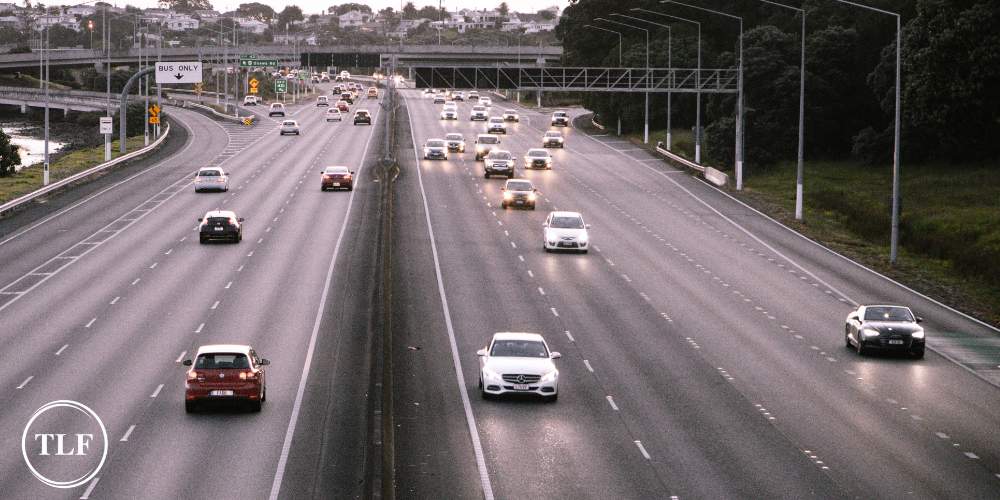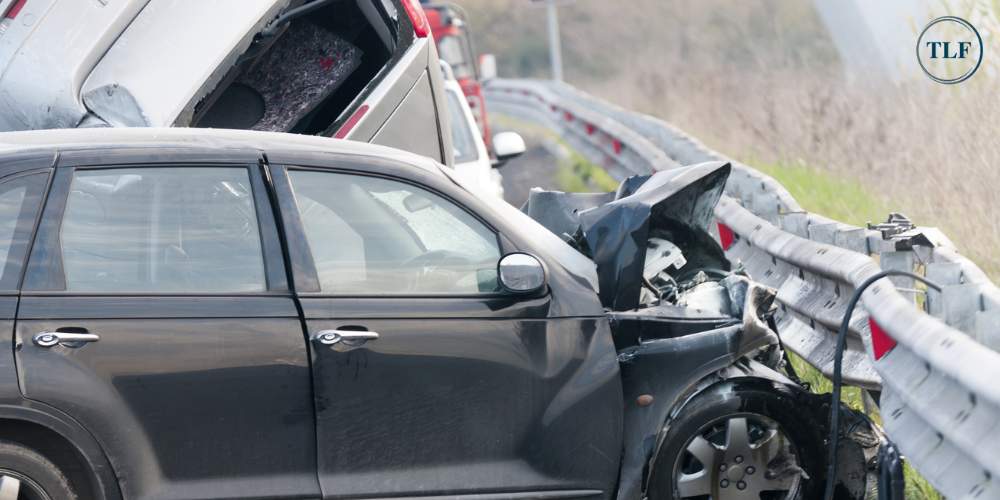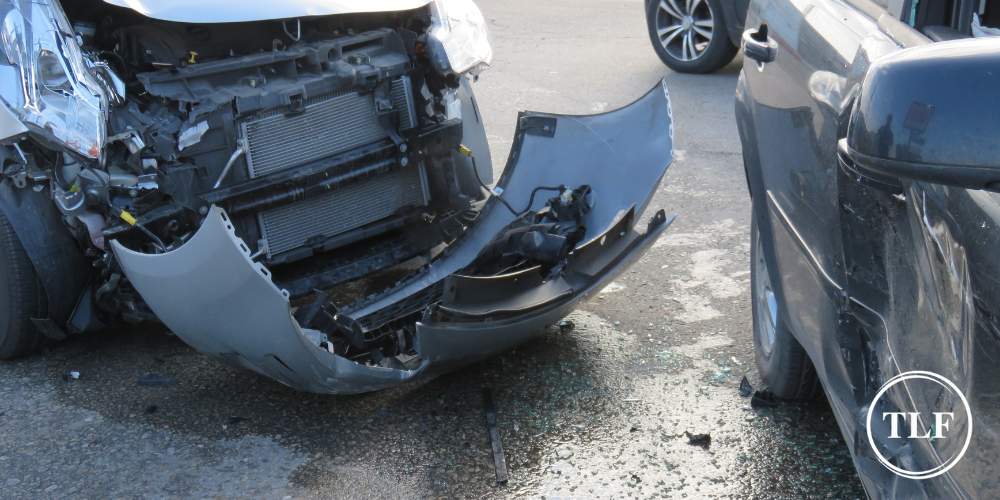Picture this: you’re cruising down a seemingly endless stretch of highway, the road unrolling beneath your wheels, when suddenly, you start approaching your destination without a clear memory of your drive. If this has ever happened to you, you may have experienced highway hypnosis.
Highway hypnosis is a phenomenon that causes a driver to fall into a trance-like state while driving for an extended period on a monotonous stretch of road. While it may sound innocuous, highway hypnosis poses a real danger to drivers and passengers alike.
Below, we’ll go into what exactly highway hypnosis is, how it’s caused, why it’s dangerous, and how to prevent it. If you have been injured in a car accident as a result of highway hypnosis, you may be able to file a personal injury case against the negligent driver who caused the wreck.
The Ohio and Northern Kentucky auto accident attorneys at TLF understand the dangers of highway hypnosis and are here to help ensure you receive the compensation you deserve. Our experienced attorneys have the knowledge and expertise needed to effectively advocate on your behalf and help you achieve the best possible outcome for your case.
Call us toll-free at (800) 698-4054 to schedule a free initial consultation with a member of our legal team today.

Definition of Highway Hypnosis
Highway hypnosis, also known as “white line fever,” is a mental state in which a person experiences a partial or complete loss of awareness while driving for an extended period of time. This typically occurs when someone is driving on a long but familiar route, like a highway. The monotony of the road combined with a lack of external stimulation can cause a driver to fall into this trance-like state.
During highway hypnosis, a driver may continue operating their vehicle safely, but with decreased attention and awareness of their surroundings. This can increase the risk of accidents as drivers may fail to notice changes in traffic conditions, road hazards, or other important driving cues.
How Does Highway Hypnosis Happen?
Highway hypnosis occurs as a result of multiple factors that work together and reduce the driver’s attention to the road. Long stretches of highway are incredibly repetitive and monotonous, making them less cognitively engaging. Driving down boring highways for long distances can cause the brain to essentially “auto-pilot” and function without much conscious thought.
As drivers travel along familiar routes at a constant speed, their attention may shift away from the task of driving, leading to a decrease in vigilance and alertness. Additionally, the lack of novel stimuli, like buildings, as well as the lack of external cues, like traffic lights or street signs, can further exacerbate this phenomenon.
The brain can easily perceive the highway as predictable and unchanging, which can lead to brain inattention. This gradual decline in cognitive engagement causes drivers to “zone out” entirely, losing track of time and awareness of their surroundings.

Highway Hypnosis vs. Distracted Driving
Highway hypnosis and distracted driving are two distinct but related phenomena that can impair a driver’s ability to operate a vehicle safely. Highway hypnosis involves a state of reduced awareness and attention, where the driver’s eyes and hands are engaged in the act of driving, but their mind isn’t entirely involved in the activity.
Distracted driving, however, involves diverting attention away from the task of driving due to external stimuli or activities, where the driver’s eyes, hands, and/or mind are engaged in an entirely different task. For example, texting while driving.
Despite their differences, both highway hypnosis and distracted driving can be the result of boredom behind the wheel. Additionally, both phenomena can compromise a driver’s ability to perceive and respond to potential hazards on the road, increasing the risk of motor vehicle accidents.
Highway Hypnosis vs. Drowsy Driving
Much like distracted driving, drowsy driving is another distinct driving phenomenon that is similar to highway hypnosis. Highway hypnosis is a trance-like state that drivers experience when driving down long, boring roads, but drowsy driving is a state in which a fatigued driver falls asleep momentarily while driving.
Both highway hypnosis and drowsy driving can cause drivers to experience gaps in their memory of the drive but for different reasons. Drowsy drivers often fall asleep for a few seconds while driving, but drivers experiencing highway hypnosis are simply so zoned out that they can’t recall portions of their drive.
Some drivers who experience highway hypnosis feel as if they fell asleep behind the wheel, even though they were technically awake the entire time. Drivers should do what they can to avoid falling asleep and avoid falling into highway hypnosis while operating a vehicle for any amount of time.
Signs and Symptoms of Highway Hypnosis
It can be difficult to be aware of your mental state once you’ve fully slipped into a trance-like state, but there are some early signs and symptoms of highway hypnosis drivers should look out for when on boring or long stretches of road.
You may be experiencing highway hypnosis if you:
- Lose awareness or “zone out” while driving
- Have difficulty recalling recent stretches of the journey
- Notice your mind drifting to other tasks or topics
- Yawn frequently or have heavy eyelids
- Have trouble quickly responding to outside stimuli
- Miss your exit or turn
- Repeatedly drift in and out of your lane
- Feel disconnected or disoriented from your surroundings
By recognizing these symptoms, drivers can take proactive steps to combat highway hypnosis and maintain alertness when behind the wheel.

Dangers of Highway Hypnosis
While it may not seem like much of an issue, highway hypnosis can be extremely dangerous. When drivers enter a state of highway hypnosis, their attention and awareness become compromised, causing them to be less responsive to external stimuli. This brain inattention increases the risk of accidents as drivers may fail to notice changes in traffic conditions, road hazards, or other critical cues.
Highway hypnosis can also lead to an increased likelihood of drowsiness or fatigue, further exacerbating the risk of collisions. Additionally, the prolonged exposure to monotony and lack of stimulation associated with highway hypnosis can contribute to driver fatigue, which can impair their judgment and decision-making abilities.
Another thing that makes highway hypnosis dangerous is the increased risk of trucking accidents. Semi-truck drivers often drive for extended periods of time on boring, monotonous roads with very few opportunities to stop and take a break. This, combined with the size and weight of these vehicles, makes it incredibly dangerous for these drivers to fall into highway hypnosis and be responsible for a commercial truck accident.
According to the National Highway Traffic Safety Administration, highway hypnosis contributes to tens of thousands of auto accidents across the country every year. Not only that, but they also lead to hundreds of fatal motor vehicle accidents each year.
How To Avoid Highway Hypnosis
There are a number of proactive measures that drivers can take to help avoid highway hypnosis. Some of the best ways to prevent highway hypnosis on a long drive include:
- Turning off cruise control
- Taking frequent breaks
- Getting fresh air
- Getting sound sleep the night before
- Maintaining good posture
- Practicing mindfulness and taking note of your surroundings
- Engaging in conversation with passengers
- Listening to engaging music, podcasts, or audiobooks
- Taking a new or different route
By incorporating these preventive measures into your driving routine, you can help reduce the risk of highway hypnosis and ensure a safer journey for you and your fellow motorists.

Highway Hypnosis in Personal Injury Cases
Highway hypnosis comes into play in many automobile accident injury claims. If a driver causes an accident as a result of highway hypnosis, anyone else who suffered injuries as a result of the accident can sue the negligent driver who caused the crash. However, in order for a victim to recover compensation, there has to be proof that the driver who caused the accident actually behaved negligently.
To establish negligence, attorneys may gather evidence like witness testimonies, police reports, and expert opinions to demonstrate that highway hypnosis played a role in the accident. This could include observations of the driver’s behavior leading up to the crash, like signs of drowsiness or disorientation.
Additionally, if the driver has a history of highway hypnosis or has been previously warned about the dangers of driving while fatigued, this information may also be used to establish negligence.
From a legal standpoint, highway hypnosis may be considered a form of driver negligence if attorneys can show that the driver failed to take reasonable precautions to prevent it. For instance, if the driver knew they were prone to highway hypnosis but did not take breaks or engage in activities to maintain alertness, they may be found negligent.
Personal injury claims involving car accidents and trucking accidents can be extremely complicated, which is why victims of these accidents should discuss their case with an attorney before moving forward. An Ohio or Northern Kentucky personal injury lawyer like those at TLF will know exactly how to evaluate the situation, gather evidence of negligence, and develop a strong case on behalf of the victim.
Potential Highway Hypnosis Damages
Victims of accidents caused by highway hypnosis often suffer from severe and catastrophic injuries. If you or a loved one has been injured in a car accident as a result of highway hypnosis, you may be able to recover compensation for losses such as:
- Medical expenses
- Lost wages
- Loss of earning capacity
- Physical pain and suffering
- Property damage
- Permanent disability or disfigurement
- Loss of consortium
- Emotional distress
- Funeral and burial expenses, in the event of a wrongful death
How the Ohio and Northern Kentucky Personal Injury Lawyers at TLF Can Help Victims of Accidents Caused By Highway Hypnosis
At TLF, our experienced Northern Kentucky and Cincinnati car accident lawyers understand the devastating impact that auto accidents can have on victims and their families. That’s why we’re dedicated to providing the residents of Ohio and Kentucky with compassionate support and aggressive legal representation in accident claims.
Dealing with insurance companies can be overwhelming, especially when you are recovering from an injury. Luckily, our attorneys have extensive experience negotiating with insurance adjusters and can advocate on your behalf to ensure that you receive fair and full compensation for your medical expenses, lost wages, and other damages.
Additionally, our legal team has the knowledge and expertise to navigate complex highway hypnosis accident cases. We will conduct a thorough investigation into the circumstances surrounding your accident, gather evidence to support your claim, and build a strong case on your behalf. We will fight tirelessly to hold the responsible parties accountable for their actions and secure the maximum compensation available under the law.
When you choose TLF to handle your highway hypnosis accident case, you can trust that we will stand by your side every step of the way. From the initial consultation to the resolution of your case, our attorneys will work tirelessly to protect your rights and pursue the compensation you deserve.

Call TLF For a Free Consultation To Learn More About Your Potential Personal Injury Claim
If you or a loved one has been injured in an accident caused by highway hypnosis, don’t wait to seek the legal guidance and support you need. At TLF: The Medical Injury Law Firm, our experienced attorneys are here to listen to your story, answer your questions, and provide you with the compassionate support and aggressive representation you need.
Don’t let the financial burden of your injuries hold you back from seeking justice. Contact TLF today to schedule your free consultation and take the first step toward the compensation you deserve. Your road to recovery starts here.
Call our Kentucky office at (859) 898-2472 or call our Ohio office at (513) 643-1689. You can also call us toll-free at (800) 698-4054 or contact us online to schedule your free consultation with an accident attorney on our team today.

